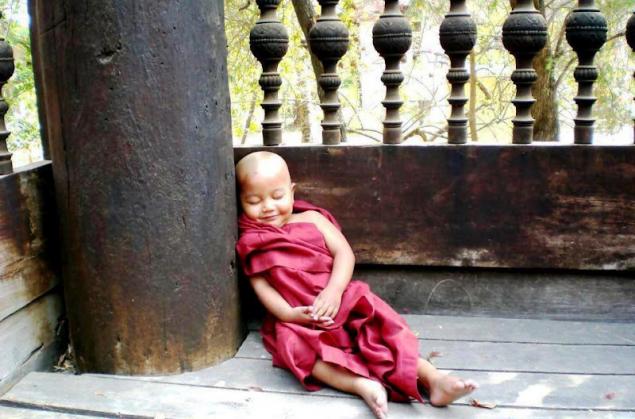3772
Three Buddhist truth, after which you "let go"
No meditation! Only philosophy! Here are the three noble truths of Buddhism, which you can use every day. And they will change your life ...
Dukkha: Life - a painful thing, and it causes suffering
Many people call Buddhism a pessimistic and negative doctrine. All - because of the well-known dogmas of religion - "Life is suffering." But the problem is that the majority of Europeans is fundamentally misunderstood this saying. Buddhism actually tells you: "Life is not a very gracious and pleasant. So that FIG him. "
The Buddhists say that we experience most of our suffering due to the fact that trying to avoid mental anguish or suppress difficult emotions. Our life is inevitably accompanied by a sense of loss, sadness, fatigue, boredom, anxiety. This constant companions of our lives. And if we try to avoid all of this by buying new gadgets, or using drugs, travel, immoderate and promiscuity, etc., it causes only more frustration, disappointment, and other forms of pain.

How to use it every day: Do not buy into the idea that you something is not enough, for "full of buzz." Disease, aging, and death - it's all part of life. Take it for what it is and stop thinking fantasies. Forget about the fact that the perfect life - a life supposedly easy and painless. This misconception has caused us to the fashion industry, entertainment and pharmaceuticals.
The sooner you accept the imperfection of life, the less disappointment awaits. And the easier it will be to open your heart uncertainty. And the easier it will "score" on the daily stress and occasional setbacks.
Anitya: Life - is a constant movement
Anitya or "impermanence" means that life as we know it, is in constant motion. We can never gain access to the time from the past. And we can not repeat the past. We do not have, and future. It is illusory.
Every morning you wake up a little bit different, not the same as they were yesterday. Our cells differ in the physical layer. In our mind - other thoughts. We have a slightly different body temperature. We breathe the air slightly different composition. Everything around us is changing, although we can not ignore. Always.
When we feel uncomfortable feeling of "inconstancy" as it may seem, it can soothe. If we know that there is nothing permanent in the world, including pain, we know that all the bad end sooner or later. But when we experience joy, then, of course, we would like to see this state was with us always. Therefore, we are afraid of the idea. But the right to be different conclusion: time joy will soon pass, you need the most focus on her, get her maximum pleasure.
If we accept the idea of the impermanence of life and its values, it is incredibly liberating. In the West, 100 years after the Buddha expressed this idea, it repeated Heraclitus famously remarking: "You can not enter the same river twice." All you actually have - is present.
How to use it every day, celebrate change. Agree that all the usual way or another ends. All the bad things that seem terrible today, will soon be over, and all the good - will remain in your memory, if you learn to enjoy it. Your attitude is more important than shoes, the new iPhone will not make happy for more than a couple of days, and the joy of communicating with kids will be repeated every day.
Anatma: you are constantly changing
When the psychiatrist asks patients that people want to get on the end of therapy, the most popular answer: "I want to find themselves." Our culture has led us to what we all believe in us if there is any constant, the true "I". It is somewhere between our heart and liver or elsewhere in the brain? Who knows!
Buddhism, however, comes from the fact that there is no fixed, stable "I". Since, according to the previous principle, everything changes, and we change something. Our personality is updated very quickly. We have a body, permanent jobs, the names of our profession - all with the help of which we identify ourselves, that is a kind of "fix".
But the main thing - that we will not be the same if we do not make previous efforts. On the other hand, our life does not change, if we do not do every day that have to change it.
How do I use it every day: Rather than focus on "the search for himself," we must focus on how to create yourself in every moment. There's no our "permanent" I only have we at this point in time. And we can change at any moment. Today is always different from yesterday. If today you are depressed, it does not mean that it will be with you always. If you can not forgive the friends or relatives of some of their offense, this does not mean that you can not forgive them later.
Once we let go of our attachment to the idea of a certain stable "I", we can relax and enjoy the moment. And tomorrow, because everything will be different. In each new moment of life you are new.
Dukkha: Life - a painful thing, and it causes suffering
Many people call Buddhism a pessimistic and negative doctrine. All - because of the well-known dogmas of religion - "Life is suffering." But the problem is that the majority of Europeans is fundamentally misunderstood this saying. Buddhism actually tells you: "Life is not a very gracious and pleasant. So that FIG him. "
The Buddhists say that we experience most of our suffering due to the fact that trying to avoid mental anguish or suppress difficult emotions. Our life is inevitably accompanied by a sense of loss, sadness, fatigue, boredom, anxiety. This constant companions of our lives. And if we try to avoid all of this by buying new gadgets, or using drugs, travel, immoderate and promiscuity, etc., it causes only more frustration, disappointment, and other forms of pain.

How to use it every day: Do not buy into the idea that you something is not enough, for "full of buzz." Disease, aging, and death - it's all part of life. Take it for what it is and stop thinking fantasies. Forget about the fact that the perfect life - a life supposedly easy and painless. This misconception has caused us to the fashion industry, entertainment and pharmaceuticals.
The sooner you accept the imperfection of life, the less disappointment awaits. And the easier it will be to open your heart uncertainty. And the easier it will "score" on the daily stress and occasional setbacks.
Anitya: Life - is a constant movement
Anitya or "impermanence" means that life as we know it, is in constant motion. We can never gain access to the time from the past. And we can not repeat the past. We do not have, and future. It is illusory.
Every morning you wake up a little bit different, not the same as they were yesterday. Our cells differ in the physical layer. In our mind - other thoughts. We have a slightly different body temperature. We breathe the air slightly different composition. Everything around us is changing, although we can not ignore. Always.
When we feel uncomfortable feeling of "inconstancy" as it may seem, it can soothe. If we know that there is nothing permanent in the world, including pain, we know that all the bad end sooner or later. But when we experience joy, then, of course, we would like to see this state was with us always. Therefore, we are afraid of the idea. But the right to be different conclusion: time joy will soon pass, you need the most focus on her, get her maximum pleasure.
If we accept the idea of the impermanence of life and its values, it is incredibly liberating. In the West, 100 years after the Buddha expressed this idea, it repeated Heraclitus famously remarking: "You can not enter the same river twice." All you actually have - is present.
How to use it every day, celebrate change. Agree that all the usual way or another ends. All the bad things that seem terrible today, will soon be over, and all the good - will remain in your memory, if you learn to enjoy it. Your attitude is more important than shoes, the new iPhone will not make happy for more than a couple of days, and the joy of communicating with kids will be repeated every day.
Anatma: you are constantly changing
When the psychiatrist asks patients that people want to get on the end of therapy, the most popular answer: "I want to find themselves." Our culture has led us to what we all believe in us if there is any constant, the true "I". It is somewhere between our heart and liver or elsewhere in the brain? Who knows!
Buddhism, however, comes from the fact that there is no fixed, stable "I". Since, according to the previous principle, everything changes, and we change something. Our personality is updated very quickly. We have a body, permanent jobs, the names of our profession - all with the help of which we identify ourselves, that is a kind of "fix".
But the main thing - that we will not be the same if we do not make previous efforts. On the other hand, our life does not change, if we do not do every day that have to change it.
How do I use it every day: Rather than focus on "the search for himself," we must focus on how to create yourself in every moment. There's no our "permanent" I only have we at this point in time. And we can change at any moment. Today is always different from yesterday. If today you are depressed, it does not mean that it will be with you always. If you can not forgive the friends or relatives of some of their offense, this does not mean that you can not forgive them later.
Once we let go of our attachment to the idea of a certain stable "I", we can relax and enjoy the moment. And tomorrow, because everything will be different. In each new moment of life you are new.
























